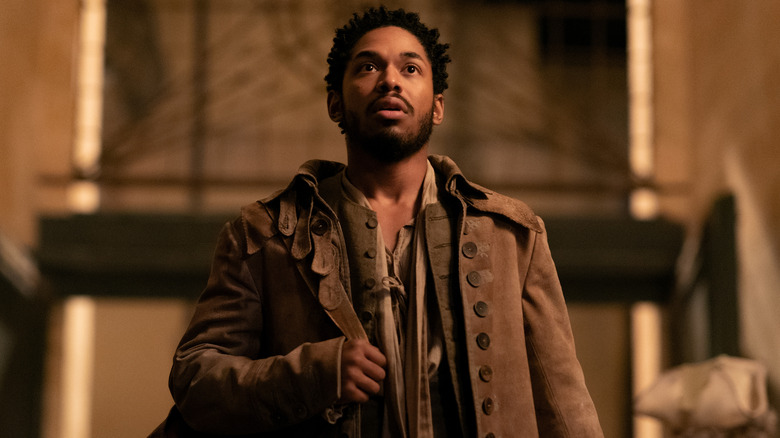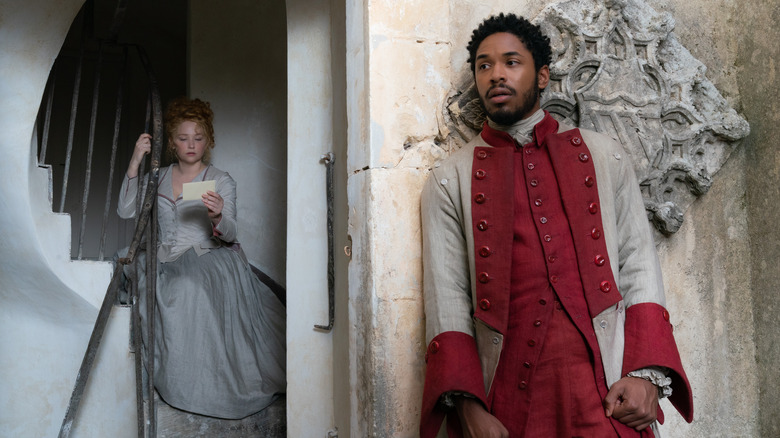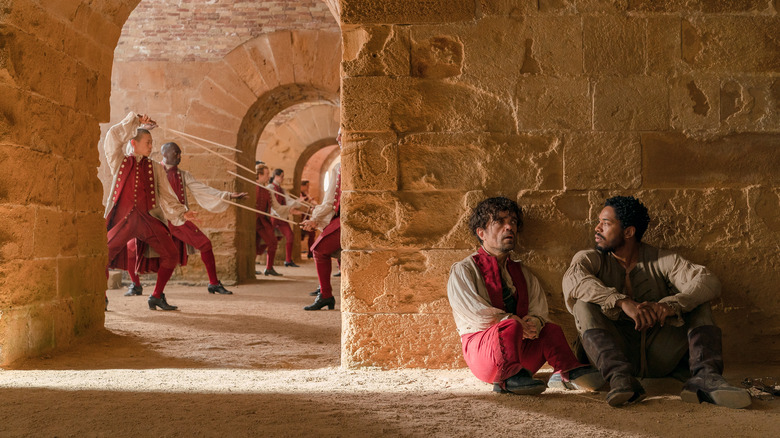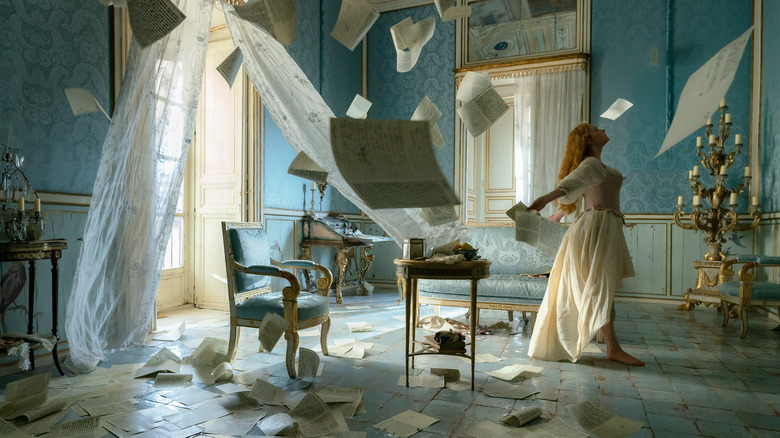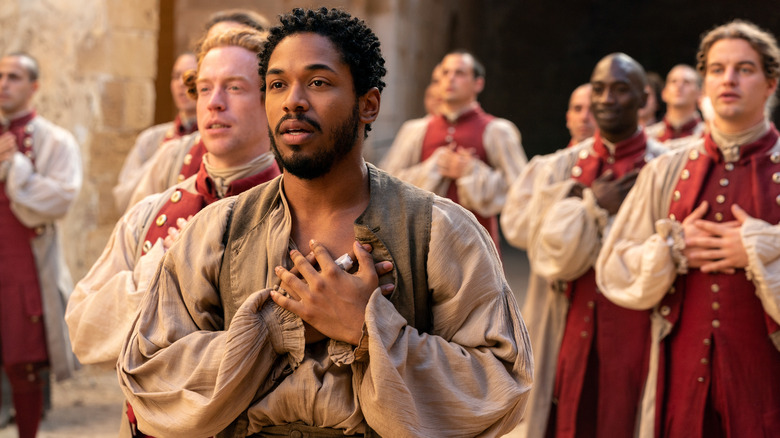Cyrano Actor Kelvin Harrison Jr. On Embracing His Musical Era And Loving Disruption [Interview]
Kelvin Harrison Jr. began his musical career with two high school stage productions and expected it to end there. But considering he grew up in a musical household — his father a classically trained saxophonist and his mother a jazz vocalist — his days of complex choreography were destined to continue. Starring in Joe Wright's "Cyrano" meant embracing grand musical numbers and stepping into a role that's been tackled onstage for over a century. On both fronts, Harrison Jr. more than rose to the occasion.
"Cyrano" reimagines the timeless love triangle of Edmond Rostand's classic play, "Cyrano de Bergerac," with Peter Dinklage taking on the titular role. Though he dazzles with "ferocious wordplay at a verbal joust and brilliant swordplay in a duel," he fears he isn't worthy of the love of his life, Roxanne (Haley Bennett). When Christian (Harrison Jr.) arrives, Christian and Roxanne fall in love at first sight and Cyrano's chance at winning her affections seems doomed. While previous iterations portray Christian as an inarticulate suitor who only manages to woo Roxanne thanks to Cyrano's words, Harrison Jr. abandons the vacant, vacuous Christian of the past.
He was drawn to the project because he "had a take on Christian that was unique." That coupled with being the first Black version of the character meant he couldn't pass on the opportunity to give Christian more depth. So he channeled his efforts into creating the earnest version of Christian that lives in Wright's film, so charismatic and compelling that it's impossible not to root for his happiness. I had the pleasure of speaking with Kelvin Harrison Jr. about his take on Christian, the many musicals coming next in his career (including Baz Luhrmann's "Elvis"), and the experience of working with Beyoncé's choreographer, Sidi Larbi Cherkaoui.
'One of the reasons I did the movie is I don't really see Black guys in period pieces'
How did "Cyrano" land on your plate? And what drew you to Christian in particular?
I think I was sitting at home in the pandemic. I was waiting for this TV show to start, and they were like, "Oh, Joe wants to meet with you," and I was like, "Oh. For what?" And they sent me an email, and it had the Cyrano de Bergerac script in it, the stage play, and I read it. And I didn't understand a thing [laughs], because I didn't understand the language. Then I met with Joe. We talked about it a little bit, and then I read the screenplay, and Joe and I had a conversation about that.
I felt like I had a take on Christian that was unique, at least in my opinion. In other iterations of the role, I've seen people lead with his confidence being in his looks and not necessarily knowing anything else but the fact that he just wants the girl. And I was, "I think that is true — except I don't necessarily think Christian knows that he is handsome." I think he's just an innocent kid who had these dreams of what love looks like and wanted to fulfill those fantasies. There's a fairy tale in it all, and he thought that's how it worked. And there's something innocent and sincere about that approach to going after winning and trusting everyone that you believe are your friends, in the process, to help you to get there. All those little things kind of made me go, "Okay, this could be cool," to go on a journey with them.
You've said before, I think this was in reference to "The Trial of the Chicago 7," you said that each of your roles is like a form of protest. So how did Christian fit into that?
I think by the fact that I was even in the movie. [laughs] One of the reasons I did the movie is I don't really see Black guys in period pieces. I know, for sure, not in Joe Wright movies. [laughs] I thought it'd be really cool to just be in that space and allow us the opportunity to be in a fantasy film and in a love story and be the handsome guy and not necessarily be — he's not dumb, he's just tongue-tied and actually the most relatable character with the most emotional intelligence. And be having the most integrity throughout the movie, as well. I think, by me taking the role, instead of ... I don't know if the second choice would've been Black. You know what I mean? If I would've said, "no," it would've gone to somebody else. So, by nature of me being in it, I thought I was disruptive, which ... I love a disruption.
So for you, what was Christian's journey through the film? I love that you make that distinction of, "He's not dumb. He's innocent." Do you think he's changed by the end of the film?
I think for him, it's once he starts to recognize that he's in a messy situation. He goes forward with it, but only because he feels like he's gotten the green light. Once it's revealed to him that, as we all know, Christian finds out that Cyrano's been writing the letters. And more importantly, that Cyrano loves Roxanne. I think that is a loss of innocence for him. I think it changes to kind of being like, "Wow, this fairy tale, this idea I had about love, isn't real." And, "I cannot actually lead by trusting everyone that I meet. That actually is a bit naive in some ways, and that's unfortunate. But now that I'm in this current situation, I choose me." Christian's always been a man that would choose himself.
I think we're vulnerable when we step into spaces where we are the minority. He's technically the minority, being the new guy, coming into a world where everyone writes poetry and writes letters and all this other stuff that's going on. He's vulnerable. He needs friends, he needs community. So he subjects himself to it, but he learns that he has to always protect himself in the process. And that is a part of growth for all of us. That's maturity and sometimes, the ugly truth of life, I guess.
'It reminded us of when we were kids, and we would dress up and pretend'
I know you grew up around musicians and were one yourself, but were stage musicals part of your experience in acting?
A little bit. I'm used to seeing my mom on stage. When I was in high school, I did one musical — actually, no, I did two musicals. I forgot about this one. I did "The Wizard of Oz" senior year, and I did "Hairspray" junior year. And so, those were my two musical moments. [laughs] And I never thought I would do another one again, to be honest. So I don't really know. It's funny to me that I've done so many musical parts. And even doing a movie like this, but it's been fun, for sure.
What was it like shooting? I read that you guys isolated in a small little Italian town, and that's where everything was filmed. What was that experience like?
It was cool. Anything was better than being in my apartment. It felt like a real blessing to be in Italy and in Sicily. And the town was so cool because around every street was like ... Ragueneau's Bakery. And Roxanne's apartment. Or it was De Guiche's house. Or all these pieces that we were shooting, we would walk past them every day. We actually kind of felt like we lived on set. The theater that's in the opening of the movie was literally in our backyard, in the house we were all staying in together. So it was easy to escape into this fantastical world and embrace our characters. Like I walked around in my boots on the cobblestone! Haley had a parasol, and then she wore the dresses. It was fun. So it felt like play. It felt like make believe. It reminded us of when we were kids, and we would dress up and pretend. My sisters had a kitchen set, and you'd play house and set up little teepees around the house and pretend it was a world. So it was very youthful.
Did the grand musical numbers with the really extensive choreography, did that add to it?
It was cool too, because I found out the choreographer was Beyoncé's choreographer. And he choreographed "APESH**." And I was, "All right, so let's get into it. Let's really get into it." So, it was fun to sit there with all these incredible dancers and learn this choreography and learn these songs and live up to the challenge of, "Can I ground this to make this feel realistic?" But also allow it the space to be kind of whimsical and camp in some ways. It's a musical, you know what I mean? Give it the space, but still have heart in every moment. It's just a good time to wake up every moment and do something like that. I don't know the next time I'll get to do it again.
Was the choreography a challenge?
It was hard. My mom always tells me I have two left feet, so I kept hearing her in my head as I was learning the choreography. But it was cool. We only had so much time, as well, with the choreography. I remember the first day they taught it to me, it was a much bigger number. And I think the thing that was the trickiest was everybody's in sync, and it wasn't like everybody's doing something different. I always thought about, Beyoncé has this bit in a behind the scenes interview. And she's always just, "Y'all know I got to sing this song, right? So don't over choreograph." And so, I'd tell Larbi, "Listen, from your own girl, y'all know I got to sing this song? So please don't over choreograph it." [laughs] "I got to get through it. We singin' live!" So yeah, it was hard, but it was good fun.
'I grew up in a musical household, and it makes no sense not to use all those skills'
One of the big battle sequences was filmed on an active volcano?
Yes, yes. Mount Aetna.
I'm sure that was really memorable.
At first we were hearing that we might not be able to go because it was snowed out. Originally, we were at the top of the mountain. And all the film equipment had been snowed on, so it was kind of covered. So they had to pull it out, drop us down lower onto the volcano, and then we started shooting there. I have these crazy videos of us hiking. We would just have to hike, in all these layers of the costume and stuff like that, up to the mountain. And we would shoot there. Two days into shooting, Aetna decided it wanted to erupt. So all you could see from our hotel was lava coming out and being, "So are we off today?" [laughs] We ended up shooting on set because time is money, I guess. That's what the studio said. And we made it work, but it definitely kept it alive, to say the least.
It's funny that you said you never thought you'd do a musical because you've been in a couple musical films already, and you have even more coming up.
I got into it. [laughs] They got me. As soon as I finished that one, I did "Elvis." And it's just fun. I realized that I grew up in a musical household, and it makes no sense not to try to use all those skills I learned over the years.
"Cyrano" feels like it harkens a little bit back to grand, classic musicals, and something like "Elvis" sounds like it's a little newer. Musical biopics have become a big thing, even just this year. Did you feel that difference, filming the two?
Oh, absolutely. It's very different when you're in a scene, and the next thing you know, you start singing, or you start dancing, or you're rubbing letters down as you sing about your love for each other. [laughs] And in the musical concert movies — not concert movies, but they're kind of concert movies — you're just being full rock star most of the time. Or performing a number. It's different. It feels more like a music video than it does, "I'm making a musical." But both are fun. Both are something we watch when we grow up and we go, "That's kind of cool. I would like to try it."
'I think I need to take a break from the musical and come back to it in three years'
You also have "Chevalier de Saint-Georges" coming up. Is preparing for a biopic different than preparing for a role like Christian, where you're doing this research and it's sort of about how much are you making it your own, and how much is it the person that you're playing?
Yeah. I think all of them have their own — I think, in some ways, Christian almost feels like a real person because he's been played so many times, he's such a well-known character. So you still have to take the iteration that exists and find your own interpretation of it. And I think that's the same thing for B.B. King and Joseph Bologne and Chevalier. I think the process was very much like, "Well, I'll take what I can from the information that's been presented in front of me about Joseph." But I would tell Joseph and B.B., before I would start filming those days, I'd be, "Listen, dog, I know you existed, but this is going to be Kelvin's interpretation of your life. We good with that?"
So, you try to honor it as much as you can, but what serves the story is the job. That's all you can do. Otherwise, it's a lot of other elements: It's the director's vision, it's this writer's vision. In some ways, I'm just in service to that as much as I can and bring the elements that still ring true, in the end, whatever comes up on the day, really.
Yeah, and it still sounds like, certainly for Christian, you had a very specific vision of what your character was and what your way into that was. Can you give me a little insight as to what that was for B.B.?
Yeah. It was a lot of work on mannerisms and the voice and also the music. And I think the thing was, B.B. speaks like he plays, and he plays like he speaks. The rhythm in which he plays gives you a hint into how he behaves, as well, and how he views himself. The prep was very much focused on, psychologically, how music relates to conversation and what he withholds and what he gives. What story is he trying to tell, and the pride he holds in himself as he's doing that. I don't know if that makes any sense, but yeah. I actually have not thought about B.B. in a while, but yeah, he was fun. It was fun.
Do you expect more musicals to come after this next bunch of them?
Yeah, listen, there's some scripts that I've read and stuff, and some things that people have asked me to do, but we'll see. We'll see. I think I need to take a break from the musical and come back to it in three years.
"Cyrano" arrives in theaters on February 25, 2022.
